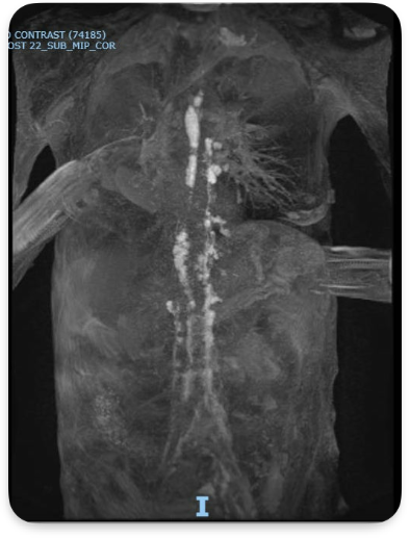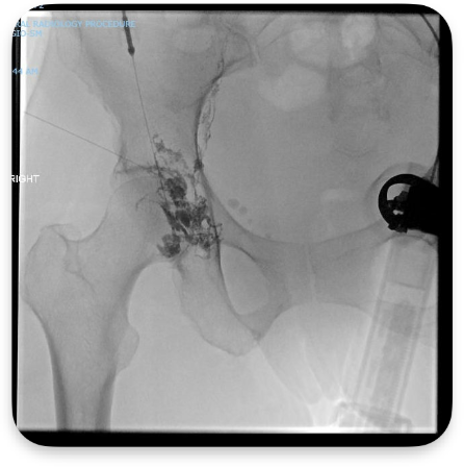Tuesday Poster Session
Category: Liver
P5972 - A Rare Cause of Chylous Ascites
Tuesday, October 28, 2025
10:30 AM - 4:00 PM PDT
Location: Exhibit Hall

Katelin Durham, MD
University of Iowa Hospitals & Clinics
Iowa City, IA
Presenting Author(s)
Katelin Durham, MD1, Alan Gunderson, MD2, Caryn Berkowitz, MD1
1University of Iowa Hospitals & Clinics, Iowa City, IA; 2University of Iowa Hospital and Clinics, Iowa City, IA
Introduction: In adults, chylous ascites is usually caused by an acquired disruption in lymphatic drainage, such as trauma, cirrhosis, heart failure, or malignancy. We report a novel case of chylous ascites and protein-losing enteropathy in an adult patient caused by central conducting lymphatic anomaly (CCLA), a congenital disorder previously described only in children.
Case Description/
Methods: A 58-year-old woman presented with abdominal pain and was found to have large-volume chylous ascites (fluid triglycerides 1,926 mg/dL). Diagnostic laparoscopy revealed chronic peritoneal inflammation, and peritoneal biopsies were negative for malignancy and tuberculosis. A liver biopsy was normal. Magnetic resonance lymphangiography showed presence of ectatic thoracic, lumbar, and pelvic lymphatic channels with multilevel lymphatic reflux and a patulous distal thoracic duct consistent with CCLA (Figure 1). Peritoneal contrast leak was observed as well, but a focal source could not be identified. She had recurrence of ascites requiring weekly large-volume paracenteses of 10-12 liters and initiation of parenteral nutrition due to severe malnutrition from ascitic fluid losses. Treatment with a high-protein, low-fat diet, octreotide, and sirolimus were ineffective. Lipiodol lymphangiography and embolization were performed with detection of a lymphatic duct leak, but this also failed to improve her ascites (Figure 2). A tunneled peritoneal catheter was placed for palliation. After developing bacterial peritonitis 18 months later, the catheter was removed—and unexpectedly, the ascites resolved allowing discontinuation of parenteral nutrition. Subsequently, she developed chylous stools and protein-losing enteropathy, with stool studies showing elevated fecal fat (52%), triglycerides (2,235 mg/dL), and alpha-1-antitrypsin (55 mg/dL).
Discussion: CCLA is a rare congenital anomaly of the central lymphatic channels which typically presents in childhood with chylothorax, chylous ascites, lymphedema, or protein-losing enteropathy. We describe an exceptionally rare diagnosis of CCLA in an adult patient. Furthermore, this case features the unanticipated resolution of treatment-refractory chylous ascites following an episode of peritonitis, which we believe resulted from peritoneal fibrosis sealing off lymphatic leaks. The subsequent re-routing of lymphatic drainage to the intestines likely caused her chylous stools. We share this case to contribute to the literature on CCLA and raise awareness that it may present in adulthood.

Figure: Figure 1. Magnetic resonance lymphangiography showing ectatic lymphatic channels and a patulous distal thoracic duct.

Figure: Figure 2. Lipiodol lymphangiography showing contrast extravasation.
Disclosures:
Katelin Durham indicated no relevant financial relationships.
Alan Gunderson indicated no relevant financial relationships.
Caryn Berkowitz indicated no relevant financial relationships.
Katelin Durham, MD1, Alan Gunderson, MD2, Caryn Berkowitz, MD1. P5972 - A Rare Cause of Chylous Ascites, ACG 2025 Annual Scientific Meeting Abstracts. Phoenix, AZ: American College of Gastroenterology.
1University of Iowa Hospitals & Clinics, Iowa City, IA; 2University of Iowa Hospital and Clinics, Iowa City, IA
Introduction: In adults, chylous ascites is usually caused by an acquired disruption in lymphatic drainage, such as trauma, cirrhosis, heart failure, or malignancy. We report a novel case of chylous ascites and protein-losing enteropathy in an adult patient caused by central conducting lymphatic anomaly (CCLA), a congenital disorder previously described only in children.
Case Description/
Methods: A 58-year-old woman presented with abdominal pain and was found to have large-volume chylous ascites (fluid triglycerides 1,926 mg/dL). Diagnostic laparoscopy revealed chronic peritoneal inflammation, and peritoneal biopsies were negative for malignancy and tuberculosis. A liver biopsy was normal. Magnetic resonance lymphangiography showed presence of ectatic thoracic, lumbar, and pelvic lymphatic channels with multilevel lymphatic reflux and a patulous distal thoracic duct consistent with CCLA (Figure 1). Peritoneal contrast leak was observed as well, but a focal source could not be identified. She had recurrence of ascites requiring weekly large-volume paracenteses of 10-12 liters and initiation of parenteral nutrition due to severe malnutrition from ascitic fluid losses. Treatment with a high-protein, low-fat diet, octreotide, and sirolimus were ineffective. Lipiodol lymphangiography and embolization were performed with detection of a lymphatic duct leak, but this also failed to improve her ascites (Figure 2). A tunneled peritoneal catheter was placed for palliation. After developing bacterial peritonitis 18 months later, the catheter was removed—and unexpectedly, the ascites resolved allowing discontinuation of parenteral nutrition. Subsequently, she developed chylous stools and protein-losing enteropathy, with stool studies showing elevated fecal fat (52%), triglycerides (2,235 mg/dL), and alpha-1-antitrypsin (55 mg/dL).
Discussion: CCLA is a rare congenital anomaly of the central lymphatic channels which typically presents in childhood with chylothorax, chylous ascites, lymphedema, or protein-losing enteropathy. We describe an exceptionally rare diagnosis of CCLA in an adult patient. Furthermore, this case features the unanticipated resolution of treatment-refractory chylous ascites following an episode of peritonitis, which we believe resulted from peritoneal fibrosis sealing off lymphatic leaks. The subsequent re-routing of lymphatic drainage to the intestines likely caused her chylous stools. We share this case to contribute to the literature on CCLA and raise awareness that it may present in adulthood.

Figure: Figure 1. Magnetic resonance lymphangiography showing ectatic lymphatic channels and a patulous distal thoracic duct.

Figure: Figure 2. Lipiodol lymphangiography showing contrast extravasation.
Disclosures:
Katelin Durham indicated no relevant financial relationships.
Alan Gunderson indicated no relevant financial relationships.
Caryn Berkowitz indicated no relevant financial relationships.
Katelin Durham, MD1, Alan Gunderson, MD2, Caryn Berkowitz, MD1. P5972 - A Rare Cause of Chylous Ascites, ACG 2025 Annual Scientific Meeting Abstracts. Phoenix, AZ: American College of Gastroenterology.
